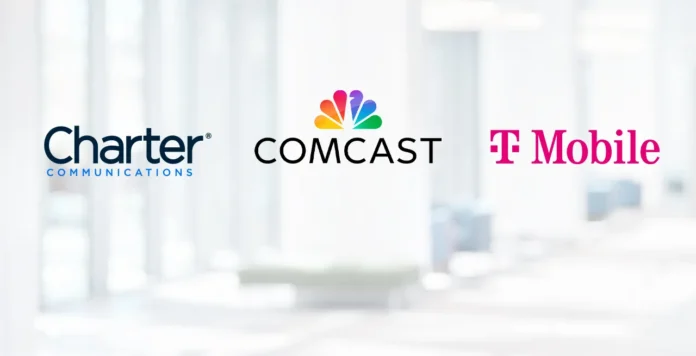The cable companies will launch enterprise-grade 5G services in 2026, targeting SMBs mobile offerings powered by T-Mobile US’ network
In sum – what to know:
Entering the enterprise wireless market – The move allows both Comcast and Charter to offer nationwide business mobility without investing in their own infrastructure.
A direct competitive threat – Verizon is now vulnerable to losing more of its core SMB business, while AT&T faces new pricing pressure in its key mid-tier market.
Comcast and Charter Communications are expanding their wireless ambitions with a new multi-year agreement to deliver 5G mobile services to business customers using T-Mobile US’ network. The service is expected to launch in 2026 under the companies’ respective mobile brands: Comcast Business Mobile and Spectrum Mobile for Business.
The deal deepens the MVNO (mobile virtual network operator) relationships that Comcast and Charter already have with T-Mobile US, but is focused specifically on enterprise-grade offerings. It enables both cable operators to provide nationwide 5G coverage for businesses without building their own wireless infrastructure — what Comcast Business President Earle Zimmermann called a “capital-light growth opportunity.”
Danny Bowman, Charter’s chief mobile officer, said the expanded relationship “allows us to rapidly and cost-effectively bring even more value to our Spectrum Mobile business customers.”
For T-Mobile, the move represents a chance to extend the reach of its network into the business market through two of the largest cable providers in the U.S. Omar Tazi, T-Mobile’s EVP and chief product and digital officer, said the partnership “complements what our T-Mobile for Business group already offers” while extending 5G access to more business customers.
Comcast and Charter launched their mobile services in 2017 and 2018, respectively, and together now serve more than 18 million mobile lines.
Michael Hodel, director of communications services equity research for Morningstar, noted earlier this week that Comcast and Charter have steadily gained wireless market share using MVNO deals, but both have continued to rely on Verizon’s network. It stands to reason, then, that their switch to T-Mobile means Verizon will lose more of its core SMB business.
AT&T is also exposed to new pressure. While the company maintains a stronghold among large enterprises, the alliance introduces a formidable new rival in the mid-market, where AT&T has long been a key player. However, as Morningstar’s Hodel noted, AT&T’s competitive position remains solid due to continued investments in fiber and 5G. “AT&T and T-Mobile have adequate assets and financial resources to invest aggressively in their networks,” he wrote. “Both rivals have steadily chipped away at Verizon’s market share lead recently, a trend we expect will continue as Verizon struggles to differentiate its offerings.”
Residential mobile offerings through T-Mobile US will continue unchanged, and financial terms of the new agreement were not disclosed. The companies said the new 5G services will roll out beginning in 2026.

